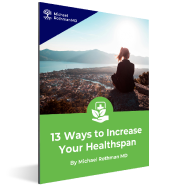Did you know that Attention Deficit Hyperactivity Disorder (ADHD) is the most common neurobehavioral disorder diagnosed in children? And unfortunately, its prevalence is growing. Diagnoses of ADHD among children in the U.S. have increased dramatically in recent years, rising 22% from 2003 to 2007, according to the Centers for Disease Control and Prevention. Today, about 9.5% of school-aged children have ADHD.
So, what’s causing the rise of this life-disrupting disease? How do you know if a child is suffering from it? What are some Attention Deficit Hyperactivity Disorder symptoms to look for? You might be surprised at what many researchers and medical wellness doctors like NJ Michael Rothman MD believe could be contributing to this disorder. Like many diseases and conditions, according to NJ holistic medical doctors at Michael Rothman MD, it has everything to do with nutrition. But the good news is, knowing the cause is the first step toward fixing the problems, and that’s what natural ADHD treatment for children is all about
What is ADHD?
First things first. What is ADHD? It’s a complex disorder of the brain caused by a combination of genetic and environmental factors. Smoking, alcohol use, and poor nutrition during pregnancy, vitamin and mineral deficiencies, excessive television-watching (as well as lack of natural sunlight) early in life, and excessive vegetable oil (omega -6 fatty acid), refined foods and sugar intake are just a few of the environmental factors that increase risk.
Attention Deficit Hyperactivity Disorder Symptoms
How can you tell if a child is suffering from this disorder? Attention Deficit Hyperactivity Disorder symptoms include restlessness, difficulty focusing, poor impulse control, distractibility, over-activity, effects of blood sugar levels, and vitamin and mineral deficiencies. These symptoms will often have significant negative consequences on the child’s academic performance, social skills, and relationships with family members, teachers and peers. In addition, ADHD symptoms are often accompanied by learning disorders, discipline problems, anxiety and/or depression.
The long term effect of such pernicious dietary practices is even more devastating, leading to a life of hormonal imbalances, obesity, and chronic degenerative diseases.
The Relationship between Nutrition and ADHD
When it comes to Attention Deficit Hyperactivity Disorder symptoms, seeking natural treatment for ADHD for children should be your first course of action. Poor nutrition, and vitamin and mineral deficiencies are significant concerns for attention problems and ADHD. Here are the top dietary factors that scientific studies have found to be linked to hyperactivity and ADHD risk:
- High sugar intake
- Inadequate micronutrient intake
- A low-nutrient diet high in processed foods and soft drinks at age 4 ½ has been associated with hyperactivity in children at age 7. Similarly, a “western” dietary pattern has also been associated with ADHD in 14-year-olds.
- Food additives and dyes, as found by a 2004 meta-analysis of 16 studies in children who were already hyperactive showed that their hyperactive behavior increased after ingesting food colorings
- Pesticides (called organophosphates) commonly found on some fruits and vegetables are associated with ADHD.
- Excessive intake of fried foods and vegetable oils alter brain and body chemistry leading to inflammation and cognitive impairment.
- Neuro-excitoxic poisons like nitrates and nitrites (found in cured meats), MSG (monosodium glutamate), Aspartame (an artificial sweetener) can contribute to hyperactivity states.
Natural Treatment of ADHD for Children
According to Dr. Michael Rothman at Michael Rothman MD, often times these children are suffering from the effects of blood sugar levels, and vitamin and mineral deficiencies. Holistic health nutrition takes a whole-body approach to disorders like ADHD so that real, permanent healing and transformation take place.
When the blood sugar is too low your child’s brain will be starved for energy making concentrating difficult, hence the “attention deficit”. Simultaneously these same low blood sugar levels will stimulate adrenaline release from your child’s adrenal glands to raise his/her blood sugar to normal. This adrenaline rush leads to hyperactivity.
What causes the low blood sugars in the first place? Processed foods that are high in refined carbohydrates and sugars and low in minerals will cause a rapid elevation of blood sugar (which can also lead to hyperactivity). Since “what goes up, must come down”, these rapid rises in blood sugar lead to “reactive hypoglycemia” (low blood sugar).
To make matters worse, these fluctuating blood sugar levels cause your child to excessively use up his/her vital mineral reserves. Your child’s mineral levels become woefully inadequate to support normal neurological functioning especially when combined with a diet overabundant in mineral deficient, processed foods.
Michael Rothman MD offers a science and research-based program of healing and support through metabolically directed diet and supplementation, elimination of environmental exposures and lifestyle modifications. With simple changes and a new relationship with food, children can see an enormous improvement in the effects of blood sugar levels, and vitamin and mineral deficiencies, thus decreasing the Attention Deficit Hyperactivity Disorder symptoms.










